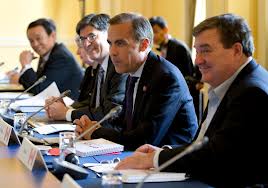A quick trip to London enabled me to enjoy the valuable discussion at a small gathering brought together at Chatham House. The conference sponsored by Chatham House and the Australian Lowy Institute spent the good part of a day examining “From the G8 to the G20 and Beyond: Setting a Course for Economic Global Governance.” Presentations by officials, former officials and policy experts produced a rich context for informal discussion.
My own view was that the most intriguing discussion of the day was a back and forth over the evolving summitry structure. Now I know there will be an immediate chorus of sighs – oh geez architecture again – but the summitry structure has important implications for the global economy and the conduct and stability of international relations. So back to the discussion.
I think there was a general consensus in the room that the large emerging market powers – frequently labelled as the BRICS countries – were failing to take up leadership at the G20. This view was aptly described recently by Harvard’s Dani Rodrik. In a piece first posted at his blog and then slightly enlarged upon at Project Syndicate – my favorite economics blog site – Rodrik examined the recent efforts of the BRICS, most notably at the BRICS Leaders Summit at Durban.
Rodrik in these posts took the opportunity to first express disappointment in what is at the moment the signature initiative of the BRICS – the effort to launch a development bank, which Rodrik described rather disparagingly in the following terms:
This approach [infrastructure financing] represents a 1950’s view of economic development, which has long been superseded by a more variegated perspective that recognizes a multiplicity of constraints – …
But Rodrik did not stop there. In a criticism that was reflected in various comments at the conference, Rodrik argued:
What the world needs from the BRICS is not another development bank, but greater leadership on today’s great global issues. … If the international community fails to confront its most serious challenges … they are the ones that will pay the highest price. Yet these countries have so far played a rather unimaginative and timid role, in international forums such as the G-20 or the World Trade Organization. When they have asserted themselves, it has been largely in pursuit of narrow national interests. Do they really have nothing new to offer?
One of the conference participants took direct aim at this tepid leadership. He suggested that the premature death predicted for the G7 and now arguably countered by revival and renewed energy evidenced by the G8 or more precisely the G7, might conceivably pressure the large emerging market countries to step up to take greater leadership in the G20. It might indeed be true that the G7 efforts especially on economic questions might give the BRICS the kind of fillip that might cause them to step up in the G20. But equally possibly these countries, the BRICS especially, might view the G7 activism as isolating the BRICS – not to mention the non-G7, non-BRICS countries like Australia, Korea or Turkey – and give impetus to those who see the BRICS as a conscious counterweight to G7 and its economic statements.
Certainly circumstances conspired to show the economic efforts of the G7. For the day following the conference the G7 finance ministers and central bankers met outside London at Aylesbury. In a statement by the UK Chancellor George Osborne the Chancellor targeted the vital economic questions of the day, “monetary activism, fiscal responsibility and structural reforms.” There certainly wasn’t consensus on these difficult issues but you coud see the rising image of the established powers working on these key economic issues as they have for decades before the emergence of the G20.
It would be a terrible waste, not to mention a destabilizing step were the G20 to lose momentum and to fail to serve as the common setting for the established and rising economic powers. Certainly the meeting of these groups at the margins of various G20 meetings can be seen to be helpful – indeed they already have – but the focus on separate coalitions is overall in my estimation unhealthy for global summitry. The G7 needs to be sensitive, more sensitive then they appear to be currently, over their gatherings and the absence of colleagues from the rest of the G20.
Let’s not throw away the first and best setting for collaborative efforts between established and rising states. Both form and substance are required.
Image Credit: G7 Finance Ministers May 11, 2013 Alyesbury – google.com


